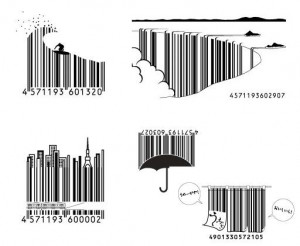As time passes, the bookmarks that are supposed to be individual posts wither away in my "TO BLOG" folder and shrink to single-sentences. It happens every month so I will go with the flow and publish them in this one big post for your viewing (time-wasting) pleasure. Here goes:
howitshouldhaveended.com has an interesting collection of alternate endings of popular movies – here’s the one for LOTR
and here’s a “Chat Version” of LOTR
and here’s the interview that Arthur C. Clarke gave on his 90th birthday
and DarkRoastedBlend.com has a collection of designer barcodes that should have been in use all over the world by now.

and if you don’t have any good music to listen to, you can listen to the sound of the Antarctic Ocean – live – here. It was raining there yesterday, and its more fun than silence (I guess).
and graphjam.com is a new website from the creators of icanhascheezburger.com that you will enjoy if you think in graphs (like most geeks).

see more funny graphs
and here is something that I wish no kid has to face in a spelling bee
and more goodies to follow in part 2.